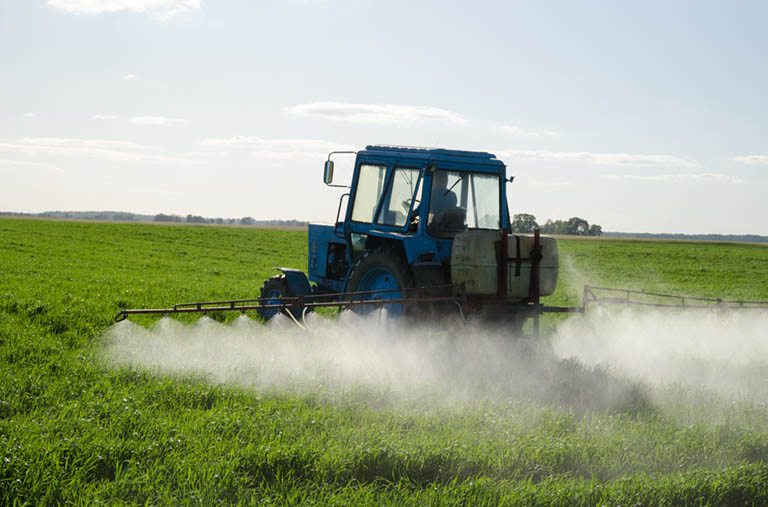Roundup is a weed and grass-killer that has been linked to cancer. Lawsuits accuse Monsanto of failing to warn that glyphosate and other toxic chemicals in Roundup might cause non-Hodgkin’s lymphoma.

What is Roundup Weed Killer?
Roundup® is a glyphosate-based herbicide weed killer that kills weeds while allowing genetically modified crops to flourish. It covers more than 168 million acres in the United States and is used on almost all corn, cotton and soy farms, as well as on individual consumers’ personal lawns and gardens. Monsanto’s product is one of the most popular weedkillers in the world, because it kills pests with minimal damage to crops and the environment. It is sprayed on entire fields to kill weeds that would prevent crops from thriving. It is also used by landscapers, nursery workers, as well as by homeowners on their home gardens and yards to eliminate common weeds.
In 1970, Monsanto chemist John E. Franz discovered that glyphosate is a highly effective herbicide. In 1974, Monsanto released glyphosate to the market for agricultural use under the name Roundup. It quickly grew in popularity and now generates $4 billion in revenue annually, securing its spot as the most popular herbicide in the world. Roundup is a product of Monsanto, which was acquired by Bayer in 2018 as part of its crop science division. Today, Bayer is the target of thousands of lawsuits that claim a possible association between long-term Roundup use and certain cancers. More specifically, Roundup is alleged to be linked to a group of blood cancers called non-Hodgkin’s lymphoma (NHL).
Because of Monsanto’s advertising campaign, it was widely considered one of the safest herbicides, until new research emerged from the International Agency for Research on Cancer linking it to several types of blood cancer.
The number of lawsuits filed increased after the International Agency for Research on Cancer (IARC) released a glyphosate risk assessment in 2015, categorizing the chemical as a group 2A probable carcinogen. Despite Monsanto and the Environmental Protection Agency’s (EPA) repeated denials of a link between Roundup use and cancer, there is a growing body of research that may support the IARC’s assessment. This includes research published by former EPA advisors that found heavy exposure to Roundup may increase a person’s risk of developing NHL by 41 percent. It also includes the Agency for Toxic Substances and Disease Registry’s (ATSDR) 2019 toxicological profile, which suggests a possible link between glyphosate exposure and cancer.
The main ingredient in the weed killer, glyphosate, is the product’s most worrisome component. It has been linked to the development of Non-Hodgkins Lymphoma, a deadly blood cancer. The World Health Organization conducted its own investigation following multiple claims that RoundUp was dangerous. In 2015, they declared RoundUp a “probable carcinogen,” or cancer-causing agent. In 2008, The International Journal of Cancer did research of their own, and found that people exposed to glyphosate were twice as likely to develop Non-Hodgkins Lymphoma in their lifetime. Non-Hodgkins Lymphoma is a blood cancer that attacks the white blood cells or lymphocytes, which typically safeguard the body against infections. The behavior of this cancer varies, and can either be slow to develop, sometimes not showing symptoms for years. However, other cases have cited the cancer as aggressive and quick. Studies also found RoundUp led to the development of other cancers, like leukemia, B-cell lymphoma, and multiple myeloma. Farm workers and those exposed to the chemical on a regular basis were found to be the highest at risk. Anyone exposed to glyphosate either by spraying it, breathing while it is being sprayed near you, mixing the chemical, cleaning up the chemical, or drinking or eating anything exposed to glyphosate, could be at risk.
Roundup Products Containing Glyphosate
Higher concentrations of glyphosate are used in Roundup products designed for use on harder-to-kill weeds and other invasive growth over expansive areas. Most Roundup products, including Roundup Ready III, Roundup Lawn and Garden, and Roundup Original, also contain other ingredients that help glyphosate work faster and more effectively.
Glyphosate’s toxicity may be enhanced when combined with inactive ingredients found in Roundup products. These adjuvants, or inactive ingredients in Roundup, may be hazardous to humans. Researchers have found that the combination of glyphosate with these chemicals may multiply the toxicity of the product. In other words, the chemicals may be even more powerful (and potentially dangerous) when combined with glyphosate into a single product, than when isolated on their own.
Roundup Products Glyphosate Concentration:
- Roundup Ready III: 2 percent
- Roundup Lawn and Garden: 18 percent
- Roundup Original: 41 percent
- Roundup Super Concentrate: 50.2 percent
Complications and Side Effects:
- It is alleged that individuals at the highest risk of developing NHL due to glyphosate exposure are those who use Roundup most frequently, typically as a part of their job (e.g., agricultural workers, groundskeepers, landscapers, gardeners, farmers and pesticide / herbicide applicators).Brief exposure to glyphosate can cause the following symptoms:
- Eye or skin irritation
- Irritation in the nose and throat (if inhaled)
- Saliva, burns in mouth and throat, nausea, vomiting, and diarrhea (if swallowed). If a significant amount is swallowed intentionally, it can be fatal.
Non-Hodgkin’s lymphoma presents its own set of symptoms. It is extremely important to seek medical attention if you develop any of the following signs of NHL after being exposed to Roundup:
- Swollen lymph nodes in the neck, armpits or groin
- Abdominal pain
- Chest pain or trouble breathing
- Chronic fatigue
- Sudden, unexplained weight loss
- Fever
- Night sweats
Common Types of Cancer Linked to Roundup:
- Non-Hodgkin Lymphoma
- Large Diffuse B-Cell
- Follicullar Lymphoma
- Cutaneous T-Cell
- Anapalastic T-Cell
- Chronic Lymphocytic Leukemia
- Small Lymphocytic Lymphoma
- Mantle Cell Lymphoma
- Primary Central Nervous System Lymphoma
- Multiple Myeloma
Those most at risk of developing cancer as a result of Roundup Weed Killer exposure include farm workers, landscapers, nursery workers, and others in occupations that require frequent use of herbicides like Roundup on crops. People who use Roundup for their own home gardens and lawns are also at risk, if they have used the herbicide regularly.
We will help you seek justice
To-date, three Roundup cases have gone to trial out of over 13,000 filed. In all three, juries sided with the plaintiffs, finding that Roundup was a significant factor in each plaintiff’s NHL cancer diagnosis. Damage awards have been substantial, $289 million, $80 million and $2 billion, respectively, with a large proportion of these amounts allocated as punitive damages. The Attorneys at Chhabra, Gibbs & Gustavis, P.A. are currently accepting Roundup injury cases in Mississippi. If you or someone you know was diagnosed with Non-Hodgkin Lymphoma, you should contact us immediately for a free case consultation.
If you’ve been injured from use of Roundup Weed Killer, call us today for your free consultation to discuss your rights. Chhabra, Gibbs & Gustavis, P.A. are Mississippi Attorneys that are here for you.

